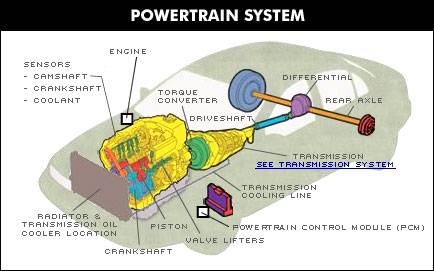
In its most broad sense, a powertrain for a vehicle is what makes it go. The powertrain basically consists of the engine, which turns the driveshaft through the transmission. The driveshaft, in a rear-wheel-drive car, turns the gears in the rear, which turn the axles that turn the wheels. The rear and the axles are also part of the drivetrain. The parts that make up the powertrain are expensive to repair. As a consequence, car manufacturers offer warranties to stand behind the durability of their workmanship. But different car companies offer different warranties that offer different coverage of different parts.
For years, most major manufacturers offered 3-year, 36,000-mile warranties, meaning it warrantied the vehicle for 36 months or 36,000 miles, whichever came first. In 1999, the little-known car manufacturer Hyundai offered the first 10-year, 100,000-mile warranty that really shook up the market. A year later, Kia followed suit and then several others began extending their warranty periods. Now, Toyota, Mitsubishi, Nissan, Infiniti, Lexus, Daimler Chrysler and Isuzu all offer powertrain warranty protections much longer than the factory warranties. Some, instead of boosting warranty protections, started offering free roadside assistance and other extras.
Some warranties have deductibles associated with certain parts and labor. For example, Daimler Chrysler's powertrain warranty was extended to 7 years but after the first 3 years you pay a $100 deductible. Also, some warranties aren't transferable, meaning if you decide to sell the car, the warranty doesn't go with it. Others require fees to transfer warranties.
Most warranties require that the vehicle be maintained according to the manufacturer's recommended maintenance schedule or the warranty will be void. So you not only have to meet the cost of the diligent care of the vehicle regarding oil and other fluid replacement, spark plugs and so on, but you must also keep records to prove you met those requirements or you may be out of luck if the engine fails. Some warranties go so far as to require that the maintenance be performed by the dealer.
Some car owners prefer paying extra for warranties rather than be faced with a costly repair bill after the initial warranty expires. Car dealers and other companies offer warranties that will, for all intents and purposes, cover the life of the car. Depending on the length and breadth of the warranty, it can get expensive so weigh the likelihood of a catastrophic failure against the additional cost. You must also factor in your ability to absorb a big car repair bill versus budgeting the extra money as part of monthly payments on the vehicle.
It is essential when purchasing a vehicle to understand fully what is covered by the warranty offered by the manufacturer. Study the warranty carefully before you purchase your car. It can be a tricky and, sometimes, even deceptive document.